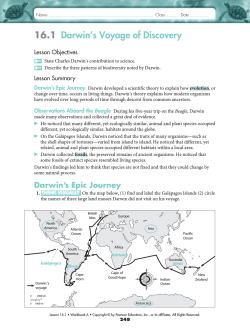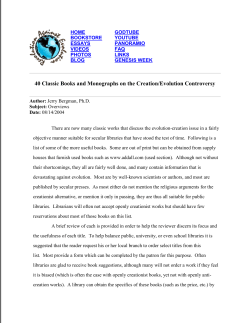
Darwin Sunday- How to Evolve Creatively
Darwin Sunday- How to Evolve Creatively Rev. Arthur G. Severance Interim Minister First Unitarian Universalist Church Stockton, California February 3, 2013 Darwin said, “A mathematician is a blind man in a dark room looking for a black cat that doesn't exist.” Someone else said: Philosophy is like a blind man being in a dark room and looking for a black cat. Metaphysics is like a blind man being in a dark room and looking for a black cat that isn't there. Theology is like a blind man being in a dark room and looking for a black cat that isn't there and shouting “I found it!" There is the old joke about one day when the zookeeper noticed that the orangutan was reading two books: the Bible and Darwin’s Origin of the Species. Surprised he asked the ape, why are you reading both those books? Well, said the orangutan, I just wanted to know if I was my brother’s keeper or my keeper’s brother. Scientist Luther Burbank: Those who would legislate against the teaching of evolution should also legislate against gravity, electricity and the unreasonable velocity of light, and also, should introduce a clause to prevent the use of the telescope, the microscope and the spectroscope or any other instrument of precision which may in the future be invented, constructed or used for the discovery of truth." In an August 15, 2006 NY Times article on evolution and Creationism, astounding stats- Did Humans Evolve? Not Us, Say Americans. In surveys conducted in 2005, people in the United States and 32 European countries were asked whether to respond ''true,'' ''false'' or ''not sure'' to this statement: ''Human beings, as we know them, developed from earlier species of animals. 'The United States had the second-highest percentage of adults who said the statement was false and the second-lowest percentage who said the statement was true, researchers reported in the current issue of Science. Only 39.7% in US accept evolution! Only adults in Turkey expressed more doubts on evolution. In Iceland, 85 percent agreed with the statement. Sir Robert May, President of the Royal Society in England, said perhaps about evolution and those people who don’t believe in it- "We share half our genome with the banana. This is more evident in some of my acquaintances than others.” Or British Biologist, JBS Haldane after a lifetime studying creation was asked what he had been able to conclude about the nature of the Creator. “God,” he said dryly, Seems inordinately fond of beetles. Did you know that Darwin and Abraham Lincoln were born on the same day- February 12, 1809? Or that there is a movement to make Darwin’s birthday a holiday? Or that the majority of Americans still don’t believe in evolution? Or that Darwin held off for more than 20 years publishing his world and religion changing book on evolution, because he was afraid he might be accused of killing God and destroying Christianity? Or that he started Cambridge to study for the Anglican clergy, even though his family had been dissenting Unitarians. Or that when he started his famous voyage on the Beagle, he still believed literally in the Bible, but by the time he returned he was an agnostic? He married his cousin and they had 10 children; he was reported to be a devoted and uncommonly attentive father. Two dies as babies, and overtime one got sick, he worried that might have inherited weaknesses from inbreeding due to close family ties with his wife, Emma Wedgewood of another wealthy Unitarian family. The death of his daughter, Ann at age 10 was divesting for him, and it was said that he never forgave God for it. Darwin’s book in the middle of the 19th century effectively changed Christianity and science in a way that led to a split between the two which has never been healed by many. After all, as far back as 1650, Archbishop James Usher of Armagh, Ireland added up all the begats and generations mentioned in the Christian Bible and came up with the true creation story that God created the world on Sunday October 21, at 9:00 AM in 4004 BC. If the 18th century was a time of Enlightenment, the 19th century was a time of evolution, a revolution for traditional Christianity. Harvard zoologist, Ernst Mayr, said, (before inclusive language would have changed the word, man to humankind, perhaps) Darwin developed a new view of humanity and, in turn, a new anthropocentrism. Of all of Darwin's proposals, the one his contemporaries found most difficult to accept was that the theory of common descent applied to man. For theologians and philosophers alike, Man was a creature above and apart from other living beings. Aristotle, Descartes and Kant agreed on this sentiment, no matter how else their thinking diverged. But biologists Thomas Huxley and Ernst Haeckel revealed through rigorous comparative anatomical study that humans and living apes clearly had common ancestry, an assessment that has never again been seriously questioned in science. The application of the theory of common descent to Man deprived man of his former unique position. Indeed, Darwin has been accused of killing God, but evidently a large number of people didn’t get the memo and still think God exists, the problem being of course, what we mean by that seemingly simple three letter word which is actually one of the most mysterious and sacred of names. More people today believe in God than believe in Darwin, or at least his discoveries and theories. We don’t have to choose sides because it doesn’t have to be an either/or situation; I will argue for a both/and choice. One MIGHT realistically argue that he changed the literal way of thinking about God and creation, and it is still primarily those who interpret their scriptures literally that still have problems with Darwin as well as much of science. German Philosopher and religion critic, Friedrich Nietzsche asked: "Which is it, is man one of God's blunders or is God one of man's?" Central to his philosophy is something that sounds very UU- the idea of "life-affirmation," meaning that one must question of all religious doctrines and beliefs that drain life's expansive energies, no matter how socially prevalent and radical those views might be. I think that many religions and culture’s creation stories are myths, not lies, but metaphorical ways of commonly talking about the mystery of the beginning, and yes, even evolution, over long periods of time. Whether we call the creator God or Spider Woman as some Native American myths do, we as human beings have a deep-seated need to think of nature in anthropomorphic terms, that is human terms, even though on the one hand most religions talk of the mystery of God, prevent idolatry or even the uttering of the holy name. Indeed, Darwin himself writes: "I am a strong advocate for free thought on all subjects,” he wrote, “ yet it appears to me (whether rightly or wrongly) that direct arguments against Christianity & theism produce hardly any effect on the public; & freedom of thought is best promoted by the gradual illumination of men's minds, which follow[s] from the advance of science. It has, therefore, been always my object to avoid writing on religion, & I have confined myself to science. I may, however, have been unduly biased by the pain which it would give some members of my family, if I aided in any way direct attacks on religion." Religion does not need to be threatened by science or visa versa if one can be truly free thinking, open minded, even spiritually minded, if you’ll pardon the apparent paradox of that term. Mayr writes further, Darwinism rejects all supernatural phenomena and causation's. The theory of evolution by natural selection explains the addictedness and diversity of the world solely materialistically. It no longer requires God as creator or designer (although one is certainly still free to believe in God even if one accepts evolution). Darwin pointed out that creation, as described in the Bible and the origin accounts of other cultures, was contradicted by almost any aspect of the natural world. Every aspect of the "wonderful design" so admired by the natural theologians could be explained by natural selection. ... Eliminating God from science made room for strictly scientific explanations of all natural phenomena; it gave rise to positivism; it produced a powerful intellectual and spiritual revolution, the effects of which have lasted to this day.” Of course, Darwin didn’t eliminate God, he could have been said to contradict the literal, fundamentalist view of God, but shall we give them rights to the name or even the sacred power of Love? In 1974, Lewis Thomas wrote in The Lives of a Cell that the function of humans is communication.: "We pass thoughts around, from mind to mind, so compulsively and with such speed that the brains of mankind often appear, functionally, to be undergoing fusion....Or perhaps we are only at the beginning of learning to use the system, with almost all our evolution as a species still ahead of us. Maybe the thoughts we generate today and flick around from mind to mind...are the primitive precursors of more complicated, polymerized structures that will come later, analogous to the prokaryotic cells that drifted through shallow pools in the early days of biological evolution. Later, when the time is right, there may be fusion and symbiosis among the bits, and then we will see eukaryotic thought, metazoans of thought, and huge interlining coral shoals of thought. The mechanism is there [n.b.: in the human brain], and there is no doubt that it is already capable of functioning...We are simultaneously participants and bystanders, which is a puzzling role to play. As participants, we have no choice in the matter; this is what we do as a species." Thomas makes an observation very similar to James Lovelock's Gaia hypothesis: I have been trying to think of the earth as a kind of organism, but it is no go. I cannot think of it this way. It is too big, too complex, with too many working parts lacking visible connections. The other night, driving through a hilly, wooded part of southern New England, I wondered about this. If not like an organism, what is it like, what is it most like? Then, satisfactorily for that moment, it came to me: it is most like a single cell. Darwin was a profound influence on Emerson and one can even see the beginnings of what we now call, Nature-centered religion, which is the 2nd most popular belief, it seems, when we do belief surveys. Some also call it Naturalistic Theism, or a kind of God in or as Nature. In his 1871 book The Descent of Man, Darwin clearly saw religion and "moral qualities" as being important evolved human social characteristics. Darwin's frequent pairing of "Belief in God" and religion with topics on superstitions and fetishism throughout the book can also be interpreted as indicating how much truth he assigned to the former. Indeed, many Christians, as well as Jews find no discrepancy in believing in their religion’s God, and science, especially evolution. In the movement towards Darwin celebrations, there are now various festivals and workshops on Darwin and religious evolution. The Rev. Michael Dowd,a former UCC minster, author of the bestseller Thank God for Evolution: How the Marriage of Science and Religion Will Transform Your Life and Our World, often preaches and leads workshops at UU Churches."I hope to help attendees celebrate facts as God's native tongue and to truly get that scientific, historic, and cross-cultural evidence reveal God's word for today far more accurately than the Bible could ever hope to," Dowd said. "And if Moses, Jesus, or the Apostle Paul were alive today, they'd be the first ones to shout 'Amen!' to this." His website is: ThankGodFor Evolution.com. There is always a difference between the praxis or practice of a religion and its historical doctrines. Always an evolution despite the institutional resistance to change. One of the evolution web sites has a great picture of the two stylized fish we sometime see on cars in opposition to one another. One says Darwin inside, the other Jesus but they are kissing! Both Jesus and Buddha, for instance, were so spiritually evolved that they tried to speak to their institutional religions, Jesus to Temple Judaism and Buddha to Hinduism, and both somehow evolved into new religions! Mohammed spoke to a culture widely diverse to unite a people. Lao Tzu and Confucius were two different approaches to Eastern Wisdom that still influence Chinese Customs today! I find a common sacredness in the work of religions when they are in right relationship with each other and the world, even as we can see the perversion and terrible harm with what I will call negative religion has caused. Religion too evolves as does the idea, concept or belief in God, however we define him/her/it. The poet William Herbert Carruth (1859-1924), notice he was born the year Darwin’s famous book came out, In the first stanza of the hymn we sang says, writes: A fire-mist and a planet, A crystal and a cell, A jelly-fish and a saurian, And caves where the cave-men dwell; Then a sense of law and beauty And a face turned from the clod, -Some call it Evolution, And others call it God. Growing up in NH, during my senior year in high school, in our English class, we had to memorize that poem! We had an incredible English teacher, who had once studied for the priesthood, who probably made me think more than any teacher I had all through public school. How we decide to live with our own personal evolution should also be creative; our lives a combination of choices and random occurrences. We can decide how we react to life even if we can't always control what life sometimes seems to throw at us. We can't control who our biological family is, but we can control how we behave and how died to interact with family, friends, significant others. We can't control the history of our church, but we have a lot to do with its and our future. Not just who we choose to be the next minister, but how we react to him or her and to each other IS up to each of us as is how we react to life itself. So let us take this Darwin Sunday to encourage each other not to be afraid to EVOLVE! Creatively! And most important, lovingly! As the Hindu's greet and say s they are leaving, "Namaste"-the divine within me greets the divine within you, within all of us and all life.
© Copyright 2025





















